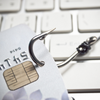UPDATED June 16, 2021
Part of our COVID-19 Consumer Protection Guide series.

Pandemics and other disasters can bring out the best in a society: first responders, medical personnel, everyday heroes doing their jobs or helping their neighbors. Unfortunately, pandemics and disasters also seem to bring out society’s worst: the scammers and predators who see the disruption as an opportunity to take advantage of people at their most vulnerable. COVID-19 is no exception: modern snake-oil salesmen have been hawking hundreds of products claiming to “prevent,” “treat,” or “cure” the novel coronavirus. Meanwhile, financial fraudsters have been offering “help” obtaining stimulus payments and other types of relief. It turns out the virus isn’t the only thing we need to protect ourselves from.
FAQs on COVID-19 Scams
Q. Are there any products that prevent, treat, or cure COVID-19?
A. Short answer: the vaccine is the best protection against COVID-19. To find out how to prevent the spread of COVID-19, check out the CDC’s website
There are no pills, supplements, oils, or drinks that you can take to prevent coronavirus. Anyone who says so is a scammer. Check the CDC guidelines on the real prevention mechanisms. And, if you see anyone trying to sell products claiming to prevent or treat the virus, report them
The FTC has also provided guidance on how to avoid scams related to COVID-19 products.
For more information on scams and vaccines, check out our guide
Q. How can I tell if a job posting is a scam?
A. If you have to pay money to get a job, it’s a scam.
There are going to be more and more scammers trying to trick people into signing up for “jobs” that they can do during the COVID-19 pandemic. The same thing happened during the 2008 financial crisis, when millions of people were out of work.
Here are some signs of a job scam:
-
If you have to pay money to get the job.
-
If you have to supply your bank account information or credit card number.
-
If they ask for your social security number before you have a real job offer.
-
If they send you a check that you’re told to deposit for “advance wages” or “errands.”
-
If the ad is for “previously undisclosed” federal jobs.
-
If the company supposedly hiring you has never heard of the job placement service.
-
If it smells like a pyramid or MLM scheme
-
If the site claims you can “work from home.”
Q. I’ve been hearing about stimulus payment scams…
A. Yes, unfortunately, scammers have employed a variety of methods to try to snatch economic impact payments (or stimulus checks).
Most economic impact payments have been delivered. If you did not receive yours, check out https://www.irs.gov/coronavirus/get-my-payment. Always use the IRS website. For more info, check out our consumer guide on economic impact payments
If you encounter any of these signs, it’s probably a scam:
-
You are getting texts, emails, and phone calls from the “IRS” or a government agency. The IRS will not call, email, or text you.
-
Someone claims they can help you get the money for a fee.
-
The person contacting you claims the IRS “overpaid” you and asks you to send some money back.
Encounter any of those? Cut off contact and report it to the IRS
By the way, in California creditors and debt collectors can’t seize COVID-related government relief payments. That includes the federal Child Tax Credit that is being distributed this summer.
Q. I found a great deal on a rental car. Is it too good to be true?
A. Probably.
With California officially reopened and more Americans traveling, rental car availability is at an all-time low and prices have gone way up. If you find a really good deal on a rental car, it might be a scam. Be sure to do your research before booking a rental car with a company you aren’t familiar with.
If you spot a rental car scam, tell the FTC
Q. What should I do if I see any of these kinds of scams?
A. Report it to the FTC.
The Federal Trade Commission takes consumer complaints of fraud and unfair or deceptive business practices. So far, the FTC and FDA have sent dozens of warning letters to companies that were advertising products claiming to prevent or cure COVID-19.
Q. It seems there’s a new scam every day! How can I keep up to date?
A. Sign up for FTC scam alerts, watch the news, and stay vigilant.
This guide is intended for informational purposes only and does not provide legal advice.